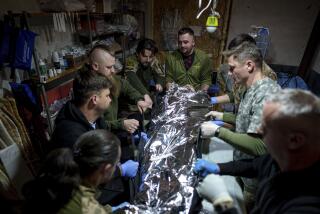Russian Sees Chechnya Gains, More Fighting : War: A top Moscow commander gives detailed and cautious appraisal of conflict, says guerrilla raids will go on for years.
- Share via
MOSCOW — Russia’s armed forces have “knocked out” most of Chechnya’s rebel army, heavy armor and field communications but still face 3,500 fighters in the Chechen capital and the likelihood of guerrilla raids from the mountains for years to come, a top Russian commander said Thursday.
Gen. Anatoly S. Kulikov, who leads 15,500 Interior Ministry troops in Chechnya, said the “greater part of the republic has been taken under control” by Russian troops after seven weeks of fighting. “The turning point has not yet been reached, but there are signs of it. . . . A lot of work has to be done.”
Kulikov’s assessment of the conflict was one of the most detailed and cautious by the Russian side so far. It came a day after his appointment and contrasted with a prewar boast by Defense Minister Pavel S. Grachev that a single paratroop regiment would need just two hours to crush the tiny Muslim republic’s self-declared independence.
President Boris N. Yeltsin has removed Grachev from overall command of the troubled Russian campaign and assigned Interior Ministry troops to take over from Grachev’s army. The newspaper Izvestia predicted Thursday that Yeltsin will soon fire Grachev, who was hospitalized this week for what was officially described as a “routine checkup.”
Speaking to reporters in Moscow, Kulikov would not say how long the army, which has had at least 40,000 troops in Chechnya, might stay. He said the army had seized three of the four districts of Grozny and was trying to capture the Chechen capital’s rebel-held Oktyabrsky district before going home.
Reporters in Chechnya said the Russian army fired artillery into Grozny and sent an armored convoy toward the ruined city from the north. Russian shelling was also reported in the villages of Argun, east of Grozny, and Samashki, to the west. Three people were reported killed in a funeral procession in Samashki, where fighting has raged all week.
Yeltsin ordered the assault on Chechnya, 1,000 miles south of Moscow, on Dec. 11. Unexpectedly fierce Chechen resistance, crumbling morale in the Russian army and outrage over the massive bombing of Chechen civilians threw Yeltsin’s government into a crisis that has cost it support at home and abroad.
Yet the Russian forces have been gaining inexorably since Jan. 19, when they captured Chechen President Dzhokar M. Dudayev’s palace in Grozny.
Kulikov said the Russians now control all of provincial Chechnya except the town of Gudermes to the east of Grozny and villages in the snow-covered plains and Caucasus Mountains to the south. He said Russian forces are insufficient to subdue those areas, so “we have to do things in consecutive stages.”
The Chechens, he said, started the war with a regular army of 15,000 men and a militia of 30,000 to 40,000--the largest estimate of their forces by a Russian official. The Russians have “destroyed the core” of the Chechen army and seized about 800 fighters, 150 armored vehicles and more than 100 artillery pieces, he said, but still face thousands of increasingly disorganized fighters. He gave no casualty count.
The general said his mission is to “mop up” resistance outside Grozny and hunt down illegally armed Chechens in Russian-controlled areas. With a database of captured Chechen payrolls, his men are making the rounds of thousands of listed addresses and rounding up any occupant having an unregistered gun.
Commenting on practices that reporters have documented as widespread, Kulikov admitted that some detainees have been beaten, and three Russian soldiers have been caught looting. While condemning such practices, he also remarked: “What human rights can we speak about? These rights have nothing to do with a person who has weapons in his hand.”
He said his men are also conducting a hearts-and-minds campaign--restoring rail, gas and water lines, and handing out bread produced in mobile field bakeries.
Kulikov said he has three special detachments trained for mountain warfare. He predicted that Chechen fighters “who have nothing to lose” will withdraw to the mountains and launch guerrilla raids that will go on for years, “interspersed and difficult to cope with.”
But he insisted that the guerrillas will not maintain the popular support that has sustained the resistance so far. “People with tears in their eyes are waiting for the moment when all this will stop,” he said. “They are dying of hunger.”
Throughout his press conference, the general insisted that the Chechens were supported by foreign mercenaries. When pressed, however, he could cite just six cases. More ominously, he said his forces had seized a truckload of Stinger antiaircraft missiles in the neighboring Russian republic of Dagestan.
Possession of the sophisticated missiles would enable the rebels, who have already shot down four helicopters, to cripple Russia’s air power, its most effective advantage.
A veteran of conflicts in the Caucasus, Kulikov insisted that the war in Chechnya will not spread elsewhere in the region.
More to Read
Sign up for Essential California
The most important California stories and recommendations in your inbox every morning.
You may occasionally receive promotional content from the Los Angeles Times.













